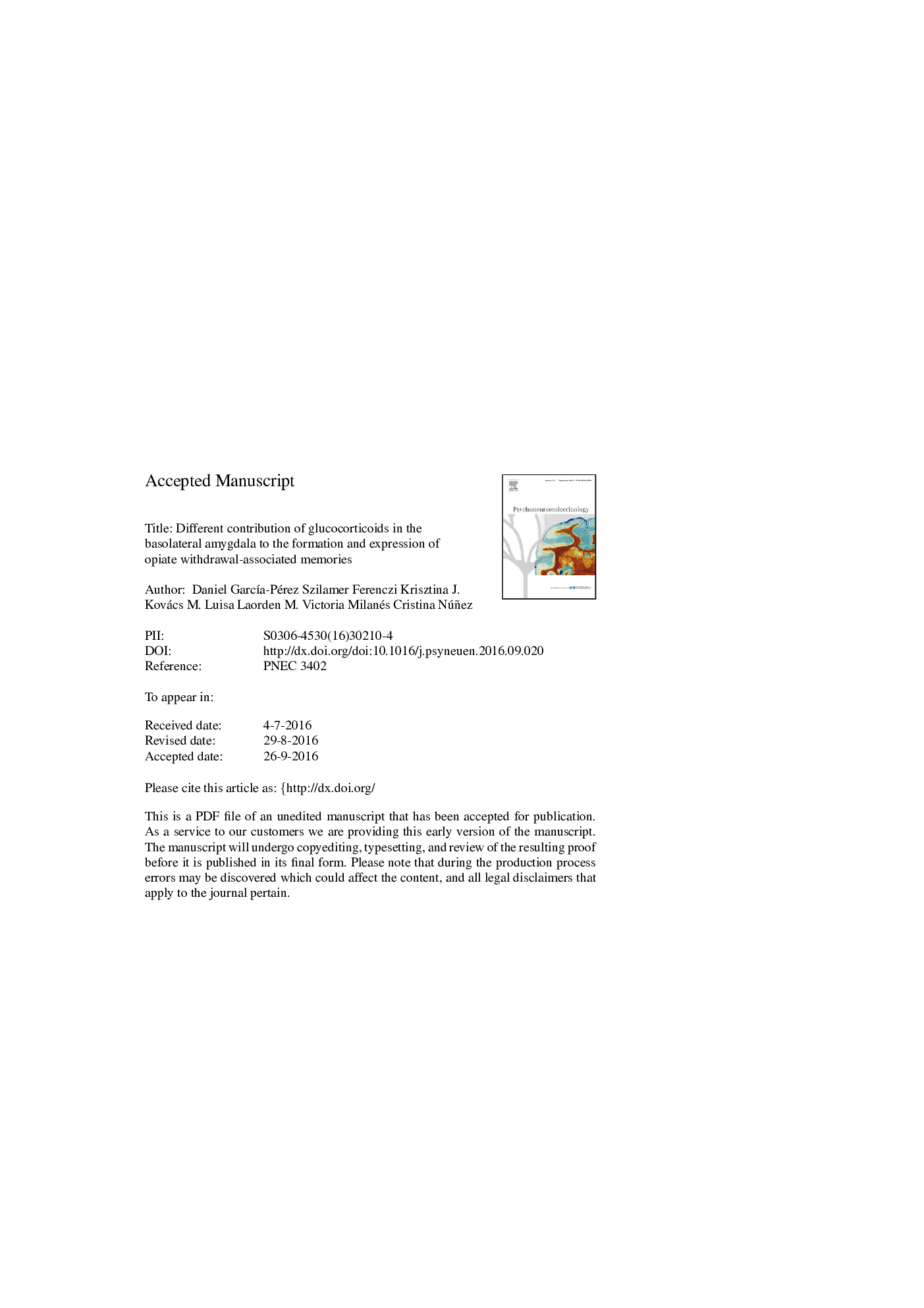| کد مقاله | کد نشریه | سال انتشار | مقاله انگلیسی | نسخه تمام متن |
|---|---|---|---|---|
| 4934678 | 1433969 | 2016 | 25 صفحه PDF | دانلود رایگان |
عنوان انگلیسی مقاله ISI
Different contribution of glucocorticoids in the basolateral amygdala to the formation and expression of opiate withdrawal-associated memories
ترجمه فارسی عنوان
سهم مختلف گلوکوکورتیکوئیدها در آمیگدال پایینتری به تشکیل و بیان خاطرات مرتبط با برداشت اپیاد
دانلود مقاله + سفارش ترجمه
دانلود مقاله ISI انگلیسی
رایگان برای ایرانیان
کلمات کلیدی
موضوعات مرتبط
علوم زیستی و بیوفناوری
بیوشیمی، ژنتیک و زیست شناسی مولکولی
علوم غدد
چکیده انگلیسی
Drug-withdrawal aversive memories generate a motivational state leading to compulsive drug taking, with plasticity changes in the basolateral amygdala (BLA) being essential in aversive motivational learning. The conditioned-place aversion (CPA) paradigm allows for measuring the negative affective component of drug withdrawal. First, CPA triggers association between negative affective consequences of withdrawal with context (memory consolidation). Afterwards, when the animals are re-exposed to the paired environment, they avoid it due to the association between the context and aversive memories (memory retrieval). We examined the influence of glucocorticoids (GCs) for a morphine-withdrawal CPA paradigm, along with plasticity changes in the BLA, in sham-operated and adrenalectomized (ADX) animals. We demonstrated that sham + morphine animals robustly displayed CPA, whereas ADX-dependent animals lacked the affective-like signs of opiate withdrawal but displayed increased somatic signs of withdrawal. Glucocorticoid receptor (GR) actions promote memory consolidation but highly depend on increases in GC levels. Interestingly, we observed that GCs were only increased in sham-dependent rodents during aversive-withdrawal memory consolidation, and that GR expression correlated with phosphorylated cAMP response element binding (pCREB) protein, early growth response 1 (Egr-1) and activity-regulated cytoskeletal-associated (Arc) mRNA induction in this experimental group. In contrast, ADX-animals displayed reduced (pCREB). GCs are also known to impair memory retrieval. Accordingly, we showed that GCs levels remained at basal levels in all experimental groups following memory retrieval, and consequently GRs no longer acted as transcriptional regulators. Importantly, memory retrieval elicited increased pCREB levels in sham + morphine animals (not in ADX + morphine group), which were directly correlated with enhanced Arc mRNA/protein expression mainly in glutamatergic neurons. In conclusion, context-withdrawal associations are accompanied plasticity changes in the BLA, which are, in part, regulated by GR signaling. Moreover, dysregulation of CREB signaling, in part through Arc expression, may enhance reconsolidation, resulting in the maintenance of excessive aversive states. These findings might have important implications for drug-seeking behavior.
ناشر
Database: Elsevier - ScienceDirect (ساینس دایرکت)
Journal: Psychoneuroendocrinology - Volume 74, December 2016, Pages 350-362
Journal: Psychoneuroendocrinology - Volume 74, December 2016, Pages 350-362
نویسندگان
Daniel GarcÃa-Pérez, Szilamer Ferenczi, Krisztina J. Kovács, M. Luisa Laorden, M. Victoria Milanés, Cristina Núñez,
